External links
- Joachim Werneburg in the German National Library catalogue
- www.joachim-werneburg.de
Joachim Werneburg (born July 15, 1953 in Erfurt, East Germany) is a German writer who publishes lyric-epic texts and short prose.
Joachim Werneburg is the son of the artist Walter Werneburg. From 1973 to 1977, he studied theoretical electrical engineering at Technische Universität Ilmenau and was a member at circle of writing students. From 1977 to 1990, he performed a double life as poet and engineer at a microelectronics company in Erfurt. After the Peaceful Revolution in Eastern Germany, he was working at an environment association and, from 1997 to 2019, as government employee.
Still in GDR-times, a mythology of Thuringia – including geology, plant, and animal beings – was written in the volume "Thüringer Meer" (Thuringian Sea). One aspect of this book is the creative conflict between the Slavic immigration (Wends) and the western conquests (by the Merowingians). A response to the zeitgeist of GDR-times can be found in sharp-tongued epigrams.
By the end of the 1980th, free adaptations from the work of the Chinese poet Pe-lo-thien were written (Bai Juyi, 772–846, Tang dynasty). These are particularly characterized by bewitching images of nature combined with social critics. Werneburg recognized Pe-lo-thien as a kindred spirit and discovered comparable existential experiences (in: "Die Reise nach Südost", Journey to South-East).
The lyric-epic poems of Werneburg written since 1980 belong to a Great Cycle, a world-poem. The Cantos of Ezra Pound served the paragon for such an approach. Of about 100 planned poet cycles, four-fifths are already present. The poem-books published since 2002 illustrate cultural landscapes of the Provence, Cornwall, and portray the mythical conflict between the antique Mediterranean or the ancient Celtic Wales. An Andalusian poem cycle refers to Islamic motifs. Pulsatively, Werneburg returns to Thuringia with his works, such as in a series of ten nature lyric elegies, which are united in the volume "Die Klage der Gorgonen" (The Gorgon's Dirge). Younger text lead to Asia, a dancing dervish, the Yellow Dragon, or the Nō-play.
Werneburg writes a work-journal with a selection provided in the book "Das Kupferbergwerk" (Copper Mine, notes from 1977 to 1989). It reflects the process of writing poems and the life in a totalitarian state. The "Notizen auf der Felswand" (Notes on the Rock’s Face) are from the time after the political turn in Eastern Germany (1990 to 1995) and illustrate the changed situation of the author – now under the conditions of an actual capitalism.
From 1979 to 1994 Walter Werneburg created colored printed graphics for 21 poem cycles. The complete joined work was published in the book "Die Rabenfibel" (The Raven´s Fibula. In „Wort und geschwungene Linie“ (Word and Swinging Line) Joachim Werneburg reports about this cooperation.
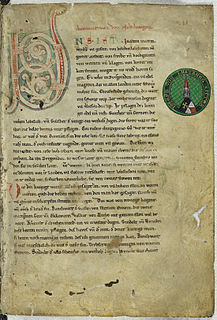
The Nibelungenlied, translated as The Song of the Nibelungs, is an epic poem written around 1200 in Middle High German. Its anonymous poet was likely from the region of Passau. The Nibelungenlied is based on an oral tradition of Germanic heroic legend that has some of its origin in historic events and individuals of the 5th and 6th centuries and that spread throughout almost all of Germanic-speaking Europe. Scandinavian parallels to the German poem are found especially in the heroic lays of the Poetic Edda and in the Völsunga saga.
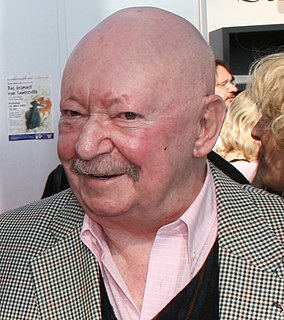
Günter Kunert was a German writer. Based in East Berlin, he published poetry from 1947, supported by Bertold Brecht. After he had signed a petition against the deprivation of the citizenship of Wolf Biermann in 1976, he lost his SED membership, and moved to the West two years later. He is regarded as a versatile German writer who wrote short stories, essays, autobiographical works, film scripts and novels. He received international honorary doctorates and awards.

Reiner Kunze is a German writer and GDR dissident. He studied media and journalism at the University of Leipzig. In 1968, he left the GDR state party SED following the communist Warsaw Pact countries invasion of Czechoslovakia in response to the Prague Spring. He had to publish his work under various pseudonyms. In 1976, his most famous book The Lovely Years, which contained critical insights into the life, and the policies behind the Iron Curtain, was published in West Germany to great acclaim. In 1977, the GDR regime expatriated him, and he moved to West Germany (FRG). He now lives near Passau in Bavaria.
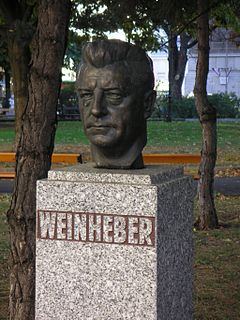
Josef Weinheber was an Austrian lyric poet, narrative writer and essayist.

Friederike Mayröcker was an Austrian writer of poetry and prose, audio plays, children's books and dramatic texts. She experimented with language, and was regarded as an avantgarde poet, and as one of the leading authors in German. Her work, inspired by art, music, literature and everyday life, appeared as "novel and also dense text formations, often described as 'magical'." According to The New York Times, her work was "formally inventive, much of it exploiting the imaginative potential of language to capture the minutiae of daily life, the natural world, love and grief".
The Swiss Book Prize is a literary award awarded annually by a jury on behalf of the Swiss Booksellers' Association. The prize amount is CHF 30,000. The award was instituted in 2008 following the example of the German Book Prize. Only German language works of authors living in Switzerland or of Swiss nationality are eligible.
Karl Albrecht Schachtschneider (born 11 July 1940, in Hütten bei Gellin, Province of Pomerania, Germany is a Professor Emeritus in Public Law at University of Erlangen in Nuremberg, Germany.

The Stiftung Ettersberg is legally established foundation, located in Weimar, Germany. Its mission is the comparative study of European dictatorships and their transition to democracy. The foundation administers the Memorial and Education Centre Andreasstrasse, a museum housed in the former Stasi prison in Erfurt.
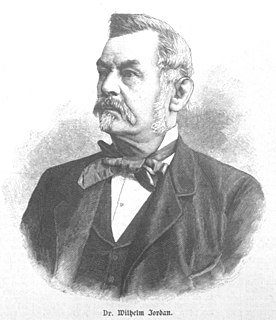
Carl Friedrich Wilhelm Jordan, sometimes shortened to Wilhelm Jordan, was a German writer and politician.
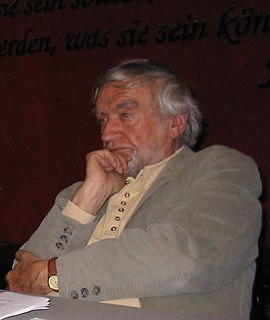
Gerhard Zwerenz was a German writer and politician. From 1994 until 1998 he was a member of the Bundestag for the Party of Democratic Socialism (PDS).
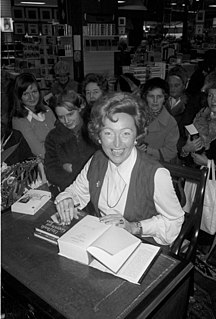
Utta Danella, Utta Schneider, was a German author.

"Was mein Gott will, das g'scheh allzeit" is a Lutheran hymn in German. The text from c. 1550 is attributed to Albert, Duke of Prussia. The melody, Zahn No. 7568, goes back to a tune by Claudin de Sermisy, written in 1529 for a secular French song. The hymn has belonged to core Lutheran hymnody without interruption and is part of the Protestant hymnal Evangelisches Gesangbuch as EG 364.
Helmut Roewer is a German lawyer and author. He served between 1994 and 2000 as president of the regional office for protection of the constitution in Thuringia. This is a state-level security agency. Controversy in respect of his time in office has persisted, although he himself robustly rejects most of the criticisms of his decisions made at that time.
Countess Sabine Elisabeth Oelgard von Bassewitz was a German writer.
Die Nibelungenklage or Die Klage is an anonymous Middle High German heroic poem. The poem describes the laments for and burial of the dead from the Nibelungenlied, as well as the spread of the news of the catastrophe that ended the other poem, and the fates of the various characters who survived. It was likely written at around the same time as the Nibelungenlied, and is appended to it as though it were another episode (âventiure).
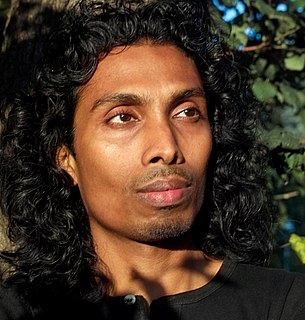
Sreeraj Gopinathan is a German contemporary artist of Indian descent. His work is characterized by its interdisciplinarity and dominated in particular by projects based on environmental and climate-relevant concepts.

The 2020 Thuringian government crisis, also known as the Thuringia crisis, was triggered by the election of Thomas Kemmerich (FDP) as Thuringian Minister President with votes from the AfD, CDU and FDP on February 5, 2020. The election attracted considerable national and international attention because, for the first time in the history of the Federal Republic of Germany, a Minister President was elected with votes from a far-right populist party, in this case the AfD.

Alexander Ziegler was a German travel writer, economist and government councilor.

Annette Dittert is a German author, filmmaker, correspondent, and journalist.

Ingo Kühl is a German painter, sculptor and architect.